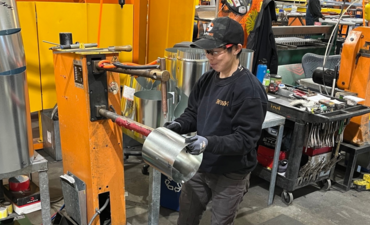
In the ever-evolving landscape of modern construction, technology analysts play a pivotal role in bridging the gap between traditional construction practices and innovative technologies. As construction projects become more complex, timelines tighten, and new materials emerge, the demand for technology analysts grows. Their expertise is key to ensuring that projects are completed efficiently, safely, and to the highest standards, all while integrating technology to enhance productivity.
What does a construction technology analyst do?
A construction technology analyst is responsible for understanding how buildings are designed, constructed, and maintained, with a focus on implementing technology to streamline and improve these processes.
In my role, I don't directly drive profit, but instead, I help those in profit-generating roles increase their capacity and efficiency. My work revolves around collaborating with teams across the company, understanding their challenges, and finding ways to help them improve. A big part of my job is asking: "What are your pain points? Where can we help?"
We focus on offering solutions that enhance productivity and safety on jobsites, even when the tasks are more complex than ever before.
Our work is about more than just solving problems; it's about building relationships and fostering collaboration across teams. We work with end-users, operations teams, and different departments to gather feedback and understand their needs. Sometimes, it's about asking for what's needed, even if it feels like a long shot, because it helps us set goals and work toward solutions. In the end, we aim to help people work more effectively, whether that means improving processes, providing new tools, or facilitating better communication.
Embracing the evolution of modern construction
Construction technology teams and roles across the AEC industry consist of individuals from a variety of backgrounds, including general contractors, architects, union tradespeople, construction operations, and design professionals. What makes someone successful in this field is some form of industry background, a desire to learn more, an eagerness to understand, and a willingness to ask questions.
While you don't need to be a coding expert or developer, it's important to understand how a building is designed, built, and maintained. Tools come and go, and companies could easily pivot from one technology to another. What's important is understanding the industry and the challenges the teams face, which takes time and hands-on experience. Learning new tools is one thing — learning how to effectively support people in the industry takes years of building relationships and understanding their day-to-day needs.
No matter your experience, if you're open to learning, you can succeed. I've been in this industry for over 20 years, and I don't call myself an expert. The field is always changing, and there's always more to learn.
Technology analysts are transforming modern construction by integrating technology into traditional practices. If you have a passion for innovation, an understanding of the construction process, and the right mindset, construction technology offers opportunities to make a real difference in the future of this industry.
Learn more on the Autodesk Construction Cloud Digital Builder Podcast.
Senior Manager of Construction Operations Technology
As Senior Manager, Construction Operations Technology, Judd collaborates with our divisions to implement and manage technology solutions nationwide, including cloud platforms like Autodesk Construction Cloud. He holds a Bachelor of Architecture from Virginia Tech, a Virtual Design and Construction certificate from the Center for Integrated Facility Engineering at Stanford University, and a Building Information Modeling certificate from the College of Built Environments at the University of Washington.




